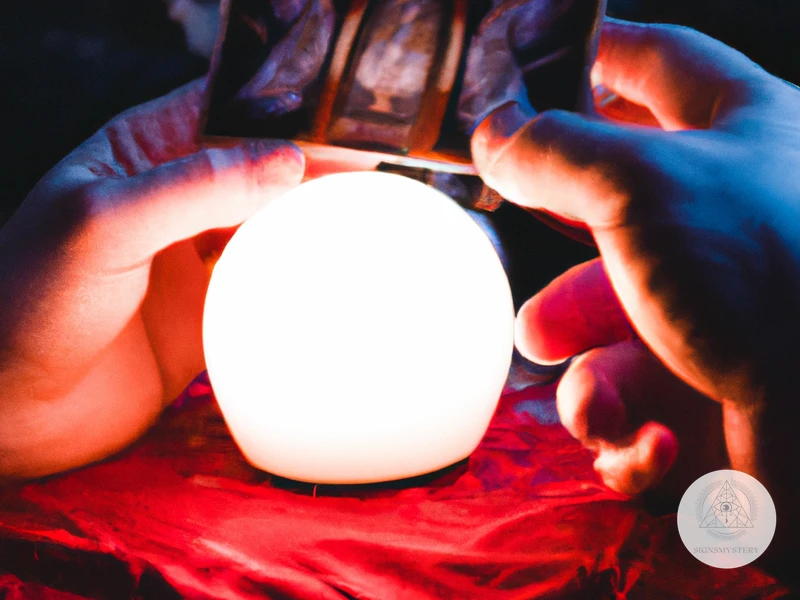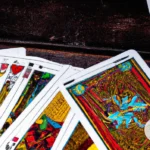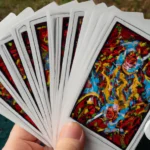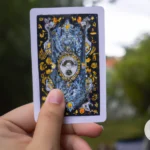The world we live in is fast-paced and constantly changing. With so much happening around us, it’s easy to lose track of ourselves and our goals. This is where self-reflection comes in. Self-reflection is the process of examining your thoughts, feelings, and experiences to gain a deeper understanding of yourself. It can be done in many ways, and one effective method is through tarot cards. Tarot cards can provide insights into your subconscious mind and help you gain clarity on important aspects of your life. In this article, we will explore the benefits of using tarot cards for self-reflection, and provide tips on how to use them effectively.
What are Tarot and Oracle Cards?
Tarot and Oracle cards are decks of cards used in divination practices to gain insights and guidance for oneself or others. Tarot cards are typically composed of 78 cards, divided into “major arcana” and “minor arcana,” which each card containing rich symbolism that can be interpreted in different ways. Oracle cards, on the other hand, can vary in number and theme, and usually have more straightforward and uplifting messages. Both types of cards can be used for self-reflection and self-growth, tapping into one’s intuition and inner wisdom. For more information on how to use Tarot cards for self-reflection, check out this self-reflection Tarot guide or this article on connecting with your inner self through Oracle Cards.
Who Can Benefit from Tarot Card Self-Reflection?
Tarot Card Self-Reflection can be beneficial for anyone who seeks a deeper understanding of themselves and their life’s purpose. It is not limited to any specific age, gender, or culture.
Here are some examples of who can benefit from Tarot Card Self-Reflection:
| People going through challenging times | Tarot cards may help provide clarity, comfort, and guidance. |
| Those looking to develop self-awareness | By interpreting tarot cards, one can gain insight into their thoughts, emotions, and behaviors. |
| Individuals who want to connect with their intuition | Tarot cards can act as a tool to tap into one’s inner voice. |
| People seeking a way to cultivate gratitude | Reflecting on the meaning of tarot cards can help individuals recognize the good in their lives. |
Some additional groups of people that can benefit from Tarot Card Self-Reflection include those who are interested in mindfulness, self-care, and self-discovery.
Whether it be used as a tool for personal growth, self-reflection, guidance, or just as a therapeutic practice, Tarot Card Self-Reflection holds value for anyone willing to give it a try.
If you’d like to explore this topic further, check out our guide on self-discovery with tarot cards or learn more about different tarot spreads for self-reflection.
How Does Self-Reflection with Tarot Cards Work?
Self-reflection with tarot cards helps us gain insight into our subconscious mind and connect with our intuition. Tarot cards are a powerful tool for self-exploration and personal growth. Each card has a specific meaning and symbolism which can help us uncover hidden emotions, thoughts, and desires.
Tarot card readings work by tapping into the collective unconscious, which is the part of our mind that holds shared beliefs, instincts, and experiences. The symbols and images on the tarot cards serve as a language that speaks directly to our subconscious mind. When we reflect on the meaning of each card and how it relates to our question or situation, we activate our intuition and access our inner wisdom.
Tarot readings allow us to explore our inner world and gain clarity about our thoughts and feelings. By reflecting on the cards we have drawn, we can identify patterns and themes in our life and gain insight into our deepest desires and fears. Tarot cards can provide guidance, comfort, and validation, as well as challenge us to grow and face our fears.
Tarot card reading is similar to using oracle cards, which are used for similar purposes but have slightly different symbols and meanings. Both tarot cards and oracle cards are powerful tools for self-reflection, mindfulness, and self-awareness, and can help us connect with our innermost selves in a profound and healing way.
In short, self-reflection with tarot cards works by using the symbolism and images on the cards to tap into our subconscious mind, gain insight into our thoughts and feelings, and connect with our intuition. Tarot cards are a powerful tool for self-exploration and personal transformation, and can help us access our inner wisdom and find clarity and guidance on our life journey.
The Benefits of Self-Reflection with Tarot Cards
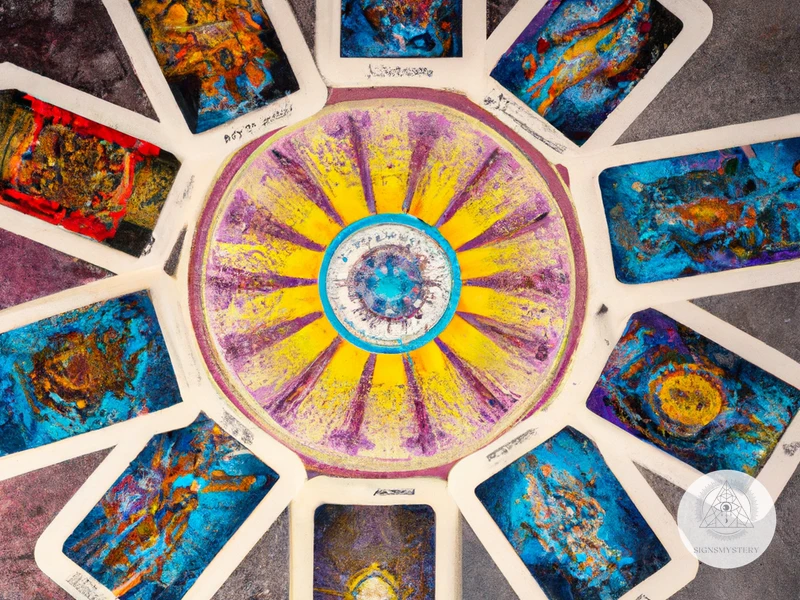
Self-reflection with Tarot cards can provide numerous benefits for individuals seeking insight and clarity in their lives. By drawing cards and reflecting on their interpretation, individuals can gain a deeper understanding of themselves and the situations they face. This can lead to increased self-awareness and a stronger connection with one’s intuition. Through the process of self-reflection, individuals can encourage positive change and cultivate gratitude, as well as increase mindfulness and promote self-care. With the ability to choose a question or topic to reflect on and interpret the cards drawn, Tarot card self-reflection allows individuals to engage in a personal and meaningful practice that can guide them towards positive transformation.
1. Gain Insight and Clarity
1. Gain Insight and Clarity
Self-reflection with tarot cards can help individuals gain insight and clarity in their lives. Tarot cards provide a visual representation of one’s thoughts and emotions, allowing them to process and understand their inner workings more clearly. By using tarot cards for self-reflection, individuals can gain a new perspective on their thoughts and feelings, and gain a deeper understanding of themselves.
The following are some ways tarot card self-reflection can help individuals gain insight and clarity:
| Tarot cards can help identify patterns and themes. | By noticing patterns and themes across multiple cards, individuals can gain insight into recurring patterns or themes in their lives. For example, if an individual keeps drawing cards related to work stress, it may indicate that they need to address their work-life balance. |
| Tarot cards can offer guidance. | The images and symbols on tarot cards can offer guidance and direction for individuals who may be feeling lost or unsure. By reflecting on the meaning of the cards, individuals can gain insight into the different options and paths available to them. |
| Tarot cards can help individuals process emotions. | The images and themes on tarot cards can evoke powerful emotions and feelings in individuals. By reflecting on these emotions, individuals can gain insight into their feelings and process them in a healthy way. |
| Tarot cards can provide clarity around decision-making. | When individuals use tarot cards for self-reflection, they can gain clarity around important decisions they may be facing. By reflecting on the meaning of the cards and their personal interpretation, individuals can make decisions with a clearer understanding of their own thoughts and feelings. |
Tarot card self-reflection allows individuals to gain deeper insight and clarity into their inner workings and thought processes. By noticing patterns, seeking guidance, processing emotions, and gaining clarity around decision-making, individuals can use tarot card self-reflection as a powerful tool for personal growth and self-discovery.
2. Develop Self-Awareness
Developing self-awareness is one of the most important benefits of self-reflection with Tarot cards. By regularly reflecting on your thoughts and behaviors through Tarot readings, you become more aware of your inner self, strengths, weaknesses, and triggers. You start to recognize and acknowledge your emotions and can learn to regulate them better.
Tarot cards provide a symbolic and intuitive framework for self-discovery, allowing you to delve deeper into your psyche and gain insights that may have been previously hidden. With each reading, you can explore different aspects of yourself and gain a better understanding of how you react to certain situations.
As you become more self-aware, you may notice patterns in your thoughts and behaviors that have been holding you back or causing difficulties in your life. By recognizing these patterns, you can take action to break free from them and move towards a more fulfilling and authentic life. Self-awareness also allows you to better understand and communicate with others, as you become more empathetic and less reactive.
Developing self-awareness can lead to increased self-esteem and self-confidence. By recognizing your strengths and accomplishments, you can appreciate and celebrate them, leading to a more positive self-image. Self-awareness also allows you to identify areas where you would like to improve, giving you a clear direction to work towards and a sense of purpose.
Self-awareness is a crucial aspect of personal growth and development. By using Tarot cards for self-reflection, you can deepen your self-awareness and gain a better understanding of your inner self. This increased awareness can lead to positive changes in all aspects of your life, empowering you to live a more authentic and fulfilling life.
3. Connect with Your Intuition
Connecting with your intuition is another major benefit of self-reflection with tarot cards. Intuition is the ability to understand something instinctively without the need for conscious reasoning. Tarot cards can help you tap into your intuition by providing a visual representation of your inner voice.
Here are some ways in which connecting with your intuition through tarot cards can benefit you:
| Benefits of Connecting with Your Intuition | Why It’s Important |
| Gain clarity on situations where logic and reasoning cannot help. | When facing a difficult decision or uncertain situation, relying solely on logic and reasoning may not be enough. Connecting with your intuition through tarot cards can provide deeper insights and guidance. |
| Develop trust in your inner voice and gut feelings. | Our intuition is always present, but sometimes we ignore or dismiss it. Regularly connecting with your intuition through tarot cards can help you develop a greater sense of trust in your inner voice and intuition. |
| Enhance creativity and problem-solving skills. | By tapping into your intuition, you can access a deeper well of creativity and problem-solving abilities. Tarot cards can offer new perspectives and insights that may not have been obvious before. |
| Experience a sense of connection to something greater than yourself. | Connecting with your intuition through tarot cards can help you feel more connected to the universe or a higher power. This can provide a sense of comfort and inner peace. |
In order to connect with your intuition through tarot cards, it’s important to approach the practice with an open and curious mind. Try not to get too caught up in memorizing the meanings of each card, and instead allow yourself to intuitively interpret the images and symbols in front of you.
Using tarot cards for self-reflection can be a powerful tool for gaining insight, developing self-awareness, and connecting with your intuition. Give it a try and see what benefits it can bring to your life.
4. Encourage Positive Change
Self-reflecting with tarot cards can also lead to positive changes in your life. By gaining insight and self-awareness, you may become more motivated to make changes that better align with your true self. Here are some ways tarot cards can encourage positive change:
| Identifying Negative Patterns: | By reflecting on your tarot readings, you may begin to notice patterns that are holding you back. Maybe you see a pattern of self-sabotage or negative self-talk. By recognizing these patterns, you can start to make changes to break free from them and move towards more positive behaviors. |
| Setting Goals: | After gaining insight and clarity, you may feel more inspired to set goals for yourself. Tarot cards can help you identify areas where you want to make progress, and provide guidance on how to achieve your goals. |
| Increasing Confidence: | Self-reflection with tarot cards can help increase your confidence and self-esteem. As you gain a deeper understanding of your desires and strengths, you may feel more empowered to make necessary changes and pursue your goals. |
| Encouraging Positive Habits: | As you become more mindful and self-aware, you may start to make positive changes to your daily habits and routines. For example, you may start a daily meditation practice or choose to eat healthier. These small changes can add up over time and lead to significant improvements in your overall well-being. |
Remember that change takes time and effort. Use the insights gained from your tarot readings to create a plan of action and take small steps towards your goals. Celebrate your successes along the way and be patient with yourself as you navigate the changes. Tarot cards can be a helpful tool in encouraging positive change, but ultimately it is up to you to take the necessary steps towards a happier, more fulfilling life.
5. Cultivate Gratitude
Cultivating gratitude is an essential part of a happy and fulfilling life. Studies have shown that people who regularly practice gratitude experience more positive emotions, are more generous, and have stronger social connections than those who don’t? So, how does self-reflection with tarot cards help to cultivate gratitude?
One way is to use tarot cards to reflect on what you are thankful for. This could include reflecting on the blessings in your life, the people who support you, or the opportunities that have come your way. Draw a few cards and look for the positive messages that they hold. Reflect on how these messages relate to the things in your life that you are grateful for.
Another way to cultivate gratitude is to use tarot cards to reframe negative thoughts. When we experience challenging situations, it’s easy to get stuck in negative thought patterns. By using tarot cards to reframe our thinking, we can develop a more positive outlook and cultivate gratitude.
For example, if you are feeling frustrated about a situation at work, draw a card and ask yourself how you can find the good in the situation. The card might encourage you to focus on the things you can control or to find the lessons in the experience. By reframing your thoughts through the use of tarot cards, you can cultivate feelings of gratitude and shift into a more positive mindset.
Here are a few tarot cards that can help cultivate gratitude:
| Tarot Card | Meaning |
|---|---|
| The Sun |
Meaning: Joy, happiness, positivity, success. This card is a reminder to focus on the good things in life and to appreciate the simple pleasures that bring us joy. |
| The Empress |
Meaning: Nurturing, abundance, creativity, gratitude. The Empress is a symbol of fertility and abundance. She reminds us to appreciate the gifts that life has to offer and to cultivate a sense of gratitude for all that we have. |
| The Four of Cups |
Meaning: Dissatisfaction, introspection, gratitude. The Four of Cups encourages us to reflect on the blessings in our lives and to find gratitude in the present moment. It reminds us that sometimes the things we seek are right in front of us if only we take a moment to appreciate them. |
By using tarot cards to cultivate gratitude, you can develop a more positive outlook on life and improve your overall well-being. Take some time to reflect on the things in your life that you are grateful for and allow the messages of the tarot to inspire and uplift you.
6. Increase Mindfulness
When engaging in self-reflection with Tarot cards, one of the benefits is the increase in mindfulness it can bring. Mindfulness is the practice of being fully present in the moment and acknowledging one’s thoughts and feelings without judgment. By using Tarot cards for self-reflection, individuals are encouraged to slow down and take the time to fully connect with their inner selves.
During a Tarot card reading, individuals are prompted to focus on a specific question or topic, drawing attention to their thoughts and feelings surrounding it. As they interpret the cards, they are encouraged to be mindful of their inner dialogue, noticing any patterns or biases that may arise. This process of self-reflection encourages increased self-awareness and helps individuals to identify any negative self-talk or limiting beliefs that may be holding them back.
Through the practice of Tarot card self-reflection, individuals can also develop a greater sense of compassion and understanding towards themselves and others. By acknowledging and accepting their thoughts and feelings without judgment, they can cultivate a more mindful and compassionate approach to life.
Additionally, the act of shuffling and drawing cards can also serve as a form of meditation, allowing individuals to quiet their minds and focus solely on the present moment. This can be especially beneficial for individuals who struggle with anxiety or overthinking, as it provides a calming and grounding effect on the mind and body.
Incorporating Tarot card self-reflection into one’s mindfulness practice can provide a powerful tool for self-discovery and personal growth. By taking the time to connect with oneself on a deeper level, individuals can cultivate a greater sense of mindfulness and compassion towards themselves and others, leading to a more fulfilling and purposeful life.
7. Promote Self-Care
One of the most important benefits of self-reflection with tarot cards is that it promotes self-care. This practice gives you the opportunity to check in with yourself and evaluate your needs. By doing so, you can identify areas where you need to practice more self-care and take action to meet those needs.
Here are some ways in which self-reflection with tarot cards can help promote self-care:
| Identifying and addressing stressors: | When you reflect on your thoughts and feelings, you can identify stressors in your life that may be impacting your well-being. Tarot cards can provide guidance on how to address these stressors. |
| Encouraging self-compassion: | Through the practice of self-reflection, you gain a deeper understanding of yourself and your inner workings. This can help you be more compassionate towards yourself and prioritize self-care. |
| Building self-confidence: | As you gain deeper insights into yourself, you can become more confident in your decisions and actions. This increased confidence can lead to a greater sense of self-empowerment and self-care. |
| Setting boundaries: | Through self-reflection, you can uncover areas in your life where you need more boundaries. Tarot cards can help you identify ways to effectively set boundaries and protect your well-being. |
| Promoting relaxation and stress relief: | Reflecting on your thoughts and feelings with tarot cards can be a calming and meditative practice. This can help you relax and manage stress, which is an important aspect of self-care. |
Self-reflection with tarot cards is a powerful tool for promoting self-care. By checking in with yourself, identifying areas for improvement, and taking action to prioritize your well-being, you can cultivate a greater sense of balance and harmony in your life.
How to Use Tarot Cards for Self-Reflection
When using tarot cards for self-reflection, there are several steps to follow. First, choose a question or topic that you would like to reflect on. This could be anything from a specific issue in your life to a more general theme like self-care or personal growth. Next, shuffle the cards and draw a few cards that resonate with you. Then, interpret the cards and reflect on what they mean for you and your current situation. It’s important to trust your own intuition and not rely solely on the literal meaning of the card. Write down your interpretation and any insights or feelings that come up during your reflection. Finally, take action based on your insights and make a plan to move forward. Using tarot cards for self-reflection can be a powerful tool for gaining insight and clarity in your life.
1. Choose a Question or Topic to Reflect on
1. Choose a Question or Topic to Reflect on: When conducting self-reflection with tarot cards, it is essential to choose a question or topic to reflect on. The question or topic should be one that is meaningful to you and relates to the area of your life you want to gain insight into.
Consider what issues or problems you may be currently facing, or what areas you would like to improve in your life. It may be helpful to write down your question or topic in your journal. Some examples of questions or topics to reflect on may include career goals, romantic relationships, personal growth, health and wellness, or financial stability.
It is important to also keep in mind that the question or topic you choose should be open-ended. Try to avoid yes or no questions, as they do not allow for deeper reflection and exploration. Instead, focus on questions that begin with “what” or “how.” This will allow for a more in-depth interpretation of the cards and provide a better understanding of your situation.
Remember that the tarot cards are a tool for self-reflection and guidance. The quality of the question you choose will directly impact the quality of the insights you gain from the reading. Take some time to reflect on what you truly want to learn about yourself and your life. Then, formulate a question or topic that will guide your reflection and help you gain the insights you seek.
2. Shuffle and Draw Tarot Cards
Once you have your question or topic in mind, it’s time to shuffle and draw your tarot cards. Start by shuffling the deck thoroughly and concentrating on your intention for the reading. Think about the question or topic you want to explore, and focus your energy on that intention.
When you feel ready, draw the number of cards you feel is appropriate for your question or topic. Some people choose to draw a single card for a quick insight, while others prefer to draw multiple cards for a more in-depth reading. It’s important to trust your intuition and choose the number of cards that feels right for you.
Once you’ve drawn your cards, lay them out in front of you and take a moment to absorb their energy. Look at each card individually and consider its meaning in relation to your question or topic. Take note of any symbols, colors, or images that stand out to you.
If you’re new to tarot, it’s important to remember that each card has multiple interpretations and meanings. Don’t be too quick to jump to conclusions or assumptions about what a card means. Take your time and allow the cards to speak to you in their own way.
As you interpret the cards, try to keep an open mind and be willing to let go of any
Subscribe to Our Newsletter
Sign up to receive the latest news and updates.
Remember, tarot cards are a tool for self-reflection and exploration. They are not a definitive answer or prediction of the future. Trust your own intuition and insights as you navigate the meanings and messages of the cards.
3. Interpret the Cards
When it comes to interpreting tarot cards for self-reflection, there are a few key things to keep in mind. First, it’s important to consider the symbolism and meaning of each card in relation to your specific question or topic. To do this, you may want to consult a tarot guidebook or online resource that can help you deepen your understanding of the cards.
As you begin to interpret the cards you’ve drawn, pay attention to both the imagery and the feelings that come up for you. Consider each card individually, but also look for patterns or connections between multiple cards in your reading.
It’s important to approach your interpretation with an open mind and a willingness to consider all possibilities. Remember that tarot readings are not necessarily predictive or set in stone – rather, they can offer valuable insight and guidance for your own journey of self-discovery and growth.
As you work with the cards, don’t be afraid to get creative and explore your own unique interpretations and associations. The beauty of tarot is that it allows for a wide range of meanings and perspectives, so feel free to draw on your own intuition and inner wisdom as you delve deeper into the cards.
Above all, keep in mind that interpreting tarot cards is a deeply personal and individual process. While it can be helpful to consult outside resources, ultimately the most important factor is your own connection to the cards and your willingness to explore their messages and insights.
4. Reflect on Your Interpretation
Once you have interpreted your Tarot cards, it is essential to reflect on the meaning behind them, as this is where you’ll find valuable insights into your life and personal growth. Take a few moments to think about the cards you drew and what message they might be conveying. Consider what emotions arise as you contemplate the cards and any connections you may see between them.
It can also be helpful to journal about your interpretation to gain further clarity. Write down your initial thoughts and feelings, and any other aspects of your life that the cards may be highlighting. Use this space to dig a little deeper into the meaning of the cards and reflect on how they relate to your life.
As you reflect, try not to judge or dismiss any insights that come up – even if they seem unpleasant or uncomfortable. These messages are here to help you grow, even if they are difficult to confront. Remember, the Tarot is a tool for self-reflection and growth, and sometimes this requires us to face challenging aspects of ourselves or our lives.
Ultimately, the goal of reflecting on your Tarot card reading is to gain a better understanding of yourself and your life path. By acknowledging and reflecting on the messages of the Tarot, you can work towards positive change and personal growth. So, take the time to reflect on your interpretation, and be open to the valuable insights that the Tarot has to offer.
5. Take Action
After interpreting the tarot cards and reflecting on their meanings, it’s time to take action. This step is crucial for making meaningful growth and positive change in your life. Here are some tips on how to put your insights into action:
| Actions to Take | Why it’s Important |
|---|---|
| Set specific goals and action steps. | By setting specific goals, you create a roadmap for achieving what you desire. |
| Create a self-care plan. | Self-care plays a vital role in maintaining your well-being and balance. Make time for self-care and stick to it. |
| Take small steps towards your goals. | Breaking down your goals into smaller steps helps you stay motivated and makes the process less daunting. |
| Reflect on your progress. | Reflection is key in tracking your growth and making adjustments along the way. Take time to reflect on your progress and accomplishments. |
| Reach out for support. | Asking for help and support from loved ones or professionals can be beneficial in achieving your goals and maintaining your well-being. |
Remember, taking action can be challenging, but it’s necessary for personal growth and positive change. Start with one small step and build from there. Celebrate your progress and be kind to yourself along the way.
Tips for Effective Tarot Card Self-Reflection
To ensure the most effective and meaningful self-reflection with tarot cards, there are several tips to keep in mind. Firstly, keeping a journal of your thoughts and interpretations can help you track your progress and notice patterns in your life. Additionally, setting intentions before each reading and creating a sacred space can help you focus and connect with your intuition. It’s important to trust your instincts when interpreting the cards, and to engage in self-care practices afterwards to integrate the insights gained. By following these tips, you can deepen your self-reflection practice and gain a greater understanding of yourself and your path forward.
1. Keep a Journal
One of the best ways to get the most out of tarot card self-reflection is to keep a journal. This helps to track progress and solidify insights gained during readings. Consider a bullet journal for a creative and individualized approach to journaling that can also serve as a planner.
To get started, create a personalized spread that meets your specific goals. For example, a spread for increasing self-care could include questions like “What do I need to feel nourished?” or “What can I do to prioritize my well-being?” Use decorative elements and colors that resonate with you.
Here are a few more tips for journaling during tarot card self-reflection:
| Tip | Explanation |
| Consistency | Make time to journal consistently, such as after each reading or at the end of each day. |
| Honesty | Write honestly and openly about your thoughts and feelings, even if they feel uncomfortable or difficult to confront. |
| Reflection | Include reflections on the insights gained during readings and how you plan to use them moving forward. |
| Gratitude | End each entry by writing down a few things you are grateful for to promote positivity and mindfulness. |
Journaling during tarot card self-reflection can be a powerful tool for personal growth and development. Not only does it create a space for reflection and introspection, but it also allows for progress tracking and accountability. Try incorporating a journal into your tarot card self-reflection practice to enhance the benefits and gain a deeper understanding of your inner self.
2. Set Intentions
In order to get the most out of self-reflection with Tarot cards, it’s important to set clear intentions before beginning. Intentions are like a roadmap that guide you towards your desired outcome. Here are some tips on how to set intentions for your Tarot card self-reflection practice:
| 1. Be clear and specific: | When setting your intention for a Tarot card reading, it’s important to be clear and specific about what you want to gain from the experience. For example, your intention might be to gain insight into a specific problem you’re facing, to better understand your emotions or to receive guidance on a difficult decision. |
| 2. Use positive language: | Make sure your intention is framed in a positive way. Instead of saying, “I don’t want to be lonely anymore,” reframe it as, “I want to cultivate meaningful relationships.” Using positive language will help you focus on what you want, rather than what you don’t want. |
| 3. Connect with your emotions: | Before setting your intention, take some time to connect with your emotions. Ask yourself what you’re feeling and why. This will help you identify what you truly want and how to frame your intention in a way that aligns with your deepest desires. |
| 4. Write it down: | Once you’ve identified your intention, write it down. Putting it on paper solidifies your commitment to your intention and makes it feel more tangible. You can also refer back to your intention later to see how it’s evolved. |
| 5. Release attachment: | Finally, it’s important to release attachment to your intention. Trust that the universe will bring you what you need, even if it’s not exactly what you had in mind. Sometimes our intentions lead us down unexpected paths that ultimately lead to growth and transformation. |
Setting intentions before your Tarot card self-reflection practice can help you focus your mind and energy on what you truly want to gain from the experience. By approaching your self-reflection with a clear sense of purpose, you’re more likely to gain insights and clarity that can lead to positive change.
3. Create a Sacred Space
Creating a sacred space is an essential aspect of self-reflection with Tarot cards. A sacred space is a physical or mental space that you create for yourself to connect with your inner self and the universe. It’s a space for contemplation, meditation, and introspection. Creating a sacred space is crucial because it helps you focus your energy and attention on your intentions and the Tarot reading. Here are some tips for creating a sacred space for your Tarot card self-reflection:
1. Choose a quiet and private space for your Tarot card self-reflection. It can be a corner of your room, your backyard, or any space where you can be alone and undisturbed.
2. Cleanse and purify the space. You can use sage, incense, or essential oils to clear negative energies and create a peaceful environment.
3. Decorate your sacred space with objects that have special meaning for you. You can use crystals, candles, spiritual symbols, or anything that inspires you and helps you connect with your higher self.
4. Set the mood with ambient music, lighting, or anything that enhances the vibe of your space. You can also use color therapy to create a specific ambiance that aligns with your intentions.
5. Create a ritual for your Tarot card self-reflection. You can light a candle, meditate, or say a prayer before you start your reading. This ritual will help you set your intentions and create a focused mindset for your Tarot card self-reflection.
By creating a sacred space for your Tarot card self-reflection, you’ll be able to connect with your inner self and the universe on a deeper level. This will help you gain clarity, insight, and guidance from the Tarot cards, and support you on your journey of self-discovery and personal growth.
4. Trust Your Intuition
Trusting your intuition is a crucial component of self-reflection with Tarot cards. While it’s important to understand the meanings and interpretations of the cards, ultimately, it’s your own inner voice that will guide you towards the insights and answers you seek.
Here are some tips for developing and trusting your intuition during a Tarot card self-reflection session:
| 1. Find a quiet and relaxed environment. It’s easier to tune into your intuition when you’re not distracted by external stimuli. |
| 2. Take a few deep breaths and clear your mind. This will help you connect with your inner self. |
| 3. Focus on the question or topic you want to reflect on. This will help you direct your intuition towards finding the answers you need. |
| 4. Pay attention to the first impressions you get from the cards. What are your initial thoughts, emotions, and sensations? These can be important clues from your intuition. |
| 5. Don’t second-guess yourself. Trust that your intuition is guiding you in the right direction. Even if your interpretations don’t make logical sense at first, give yourself permission to explore them further. |
| 6. Practice regularly. The more you work with Tarot cards for self-reflection, the more you’ll develop your intuition and trust in it. |
By trusting your intuition during self-reflection with Tarot cards, you’ll tap into your own inner wisdom and gain insights that may not have been accessible through logical thinking alone. So, be open to your intuition and let it guide you towards greater self-awareness and transformation.
5. Engage in Self-Care
Engaging in self-care is a vital component of self-reflection with tarot cards. Self-care involves taking deliberate and purposeful actions to nurture and maintain your mental, emotional, and physical health. Tarot card self-reflection can sometimes bring up difficult emotions and insights, making self-care especially important during and after the reflection process.
One of the simplest ways to engage in self-care during tarot card self-reflection is to focus on your breath. Find a comfortable seated position, close your eyes, and take slow, deep breaths. This can help you feel more centered and calm during the reflection process.
Another way to practice self-care during tarot card self-reflection is to incorporate physical movement into your routine. This can involve taking a walk outdoors, practicing yoga, or engaging in any other form of physical exercise that you enjoy. Physical movement can help release tension and stress, making it easier to process any challenging emotions or insights that arise during the reflection process.
In addition to physical movement, engaging in creative activities such as art, music or dance can also be a form of self-care. Engaging in these types of activities can help you tap into your intuition and express your emotions in a healthy and productive way.
It’s also important to practice self-compassion during tarot card self-reflection. This involves treating yourself with kindness and gentleness, rather than harsh criticism or judgment. Remember that the reflection process is a journey and it’s okay to make mistakes along the way.
Lastly, taking care of your physical body by getting enough sleep, eating nutritious foods, and staying hydrated can support your mental and emotional well-being during tarot card self-reflection. It’s important to prioritize your health and well-being so that you have the energy and focus to engage in meaningful self-reflection with tarot cards.
Conclusion
Conclusion:
In conclusion, self-reflection with tarot cards can be a powerful tool for gaining insights, cultivating self-awareness, and promoting positive change in your life. By connecting with your intuition and using tarot cards as a reflective tool, you can cultivate a deeper sense of mindfulness and gratitude, while also promoting self-care practices.
To get started with tarot card self-reflection, choose a question or topic to reflect on, shuffle and draw tarot cards, interpret the cards, and reflect on your interpretation. Remember to trust your intuition, set intentions, create a sacred space, and engage in self-care practices throughout the process.
Through regular tarot card self-reflection, you may find that you become more attuned to your own needs and desires, as well as more able to navigate the challenges and opportunities that come your way. Whether you are new to tarot cards or have been using them for years, self-reflection is a valuable practice that can help you to live a more mindful, authentic, and fulfilling life.
So why not give it a try? Grab your tarot deck, find a quiet place to reflect, and see what insights and revelations await. Remember, the practice of self-reflection takes time and patience, so be kind and compassionate with yourself along the way.
Remember: Tarot cards are a tool for self-reflection and should never be used as a substitute for professional advice or medical treatment. If you are experiencing intense emotions or mental health challenges, please seek out the support of a licensed professional.
| Benefits of Self-Reflection with Tarot Cards | How to Use Tarot Cards for Self-Reflection | Tips for Effective Tarot Card Self-Reflection |
|---|---|---|
| 1. Gain Insight and Clarity | 1. Choose a Question or Topic to Reflect on | 1. Keep a Journal |
| 2. Develop Self-Awareness | 2. Shuffle and Draw Tarot Cards | 2. Set Intentions |
| 3. Connect with Your Intuition | 3. Interpret the Cards | 3. Create a Sacred Space |
| 4. Encourage Positive Change | 4. Reflect on Your Interpretation | 4. Trust Your Intuition |
| 5. Cultivate Gratitude | 5. Take Action | 5. Engage in Self-Care |
| 6. Increase Mindfulness | ||
| 7. Promote Self-Care |
Frequently Asked Questions
What do Tarot and Oracle Cards represent?
Tarot and Oracle Cards are decks of cards with archetypal images and symbols that represent various aspects of life and the human experience.
Can Tarot Cards predict the future?
Tarot Cards can offer insights and guidance for potential future outcomes, but ultimately, the future is determined by the choices we make in the present.
Do I need to have psychic abilities to use Tarot Cards?
No, anyone can use Tarot Cards for self-reflection and personal growth without having psychic abilities.
What is self-reflection?
Self-reflection is the practice of examining one’s thoughts, feelings, and behaviors in order to gain insight and promote personal growth.
How can self-reflection benefit me?
Self-reflection can help you gain clarity, cultivate self-awareness, connect with your intuition, encourage positive change, increase gratitude, mindfulness, and promote self-care.
Can Tarot Cards be used for mental health therapy?
While Tarot Cards are not a substitute for professional mental health therapy, they can be a helpful tool for self-exploration and personal growth when used in conjunction with therapy.
Are all Tarot Cards the same?
No, there are many different types of Tarot Cards with different designs and interpretations, but they all follow a similar structure and contain archetypal images and symbols.
Do I need to be familiar with Tarot Card meanings to use them for self-reflection?
No, you can use Tarot Cards intuitively and interpret them based on your own personal associations and impressions.
Can I use Oracle Cards for self-reflection?
Yes, Oracle Cards can also be used for self-reflection and personal growth, and they typically have more flexible and diverse themes and interpretations compared to Tarot Cards.
Is self-reflection with Tarot Cards a spiritual practice?
Self-reflection with Tarot Cards can have spiritual elements, but it can also be a secular and introspective practice focused on personal growth and development.

